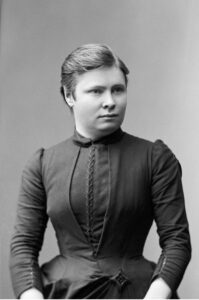We continue our series, Composers to Discover! featuring essays by students in the Public Musicology Certificate Program at Columbus State University. Violinist Samuel Vargas Teixeira has an international career as a performer and recently graduated from the Schwob School of Music at Columbus University (Georgia) with a Masters in Music. In 2021 he won first prize in the Sphinx Competition.
The transfiguration of Ida Moberg’s Voice into a Pen of Colors and Legacy
Throughout history, there are luminaries who illuminate the shadows of obscurity. Among them shines Ida Moberg (February 13,1859 – August 2, 1947), a pioneering figure whose contributions to music composition and education have left an indelible yet mostly overlooked mark on the cultural landscape. Let’s depart on a journey through the life and works of this remarkable artist, whose story unfolds like a symphony, resonating with themes of perseverance, innovation, and spiritual exploration.
Born in Helsinki, Ida Moberg embarked on her musical odyssey with a singing voice that soared with promise. Her formative years were shaped by the nurturing embrace of the Swedish-language girls’ school in Helsinki, where she imbibed the teachings of mentors such as Anna Blomqvist (choir conductor and composer who became a lifelong mentor of Ida), Maria Collan (voice professor), and Alie Lindberg (pianist). Under their guidance, Moberg’s passion for music blossomed, leading her to pursue formal vocal training from 1879 to 1883 under the tutelage of voice professor Elizabeth Zwanziger and Friederike Grün-Sadler at the St. Petersburg Conservatory.
Moberg’s journey took an unexpected turn when she encountered physical challenges with her singing voice. She then studied composition at the Orchestra School of the Helsinki Philharmonic Society (now the Helsinki Philharmonic Orchestra). She pivoted her focus to composition where her teachers were Jean Sibelius, and Ilmari Krohn; carving an unconventional path, she redefined her artistic identity. Guided by the principles of Symbolism, Impressionism, and Expressionism, Moberg’s compositions radiated with a luminous intensity that captivated the imagination.
At the heart of Moberg’s musical philosophy lay a profound connection between music and movement, a concept from her studies with Émile Jaques-Dalcroze, infusing her pedagogy with the principles of eurhythmics. Years later, Moberg brought Dalcroze’s body movement-based solfège to Finland, teaching the subject at the Helsinki Music Institute (now the Sibelius Academy) from 1914 to 1916. Understanding music through movement became an integral part of her musical thinking. She created an extensive career as music teacher at the Swedish-language school teacher seminary in Helsinki. Moberg also gave private lessons in music theory, orchestration, composition, improvisation and piano.
Central to Moberg’s oeuvre are her orchestral works, which serve as vivid reflections of her inner landscape. “Soluppgång” (Sunrise) is the first movement of a four-movement Orchestra Suite, found on Spotify on this revelatory CD by the Gothenburg Symphony (2021).
Also recently recorded is her violin concerto Tondikt (Tone Poem). Through such works she conjures evocative imagery through glorious and poignant harmonies, inviting listeners on a journey of the spirit. Yet, despite the wonders of her compositions, much of Moberg’s music remains awaiting rediscovery by a new generation of listeners. Works such as “Livets sång” (Song of Life) have yet to be performed, although this computerized version is a testament to its brilliance as well as the advocacy of the Music Society of Savo, Finland (Savon Soitannollinen seura). On account of their efforts and that of dedicated artists like violinist Mirka Malmi, Wegelius kammarstråkar, and the Gothenburg Symphony, Moberg’s music is experiencing a renaissance.
Through performances and recordings, her voice resonates once more, echoing across the centuries with a message of hope, beauty, and transcendence. I hope this blog becomes a reminder of the enduring power of music to transcend time and space, uniting us in a shared journey of discovery and expression.
References:
Music Finland – Composers & Repertoire – List of Works
Dissertation by Helena Holsti-Setälä, 2015 (using Google translate)
